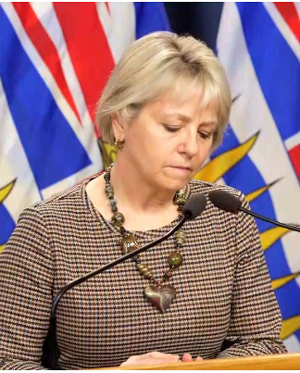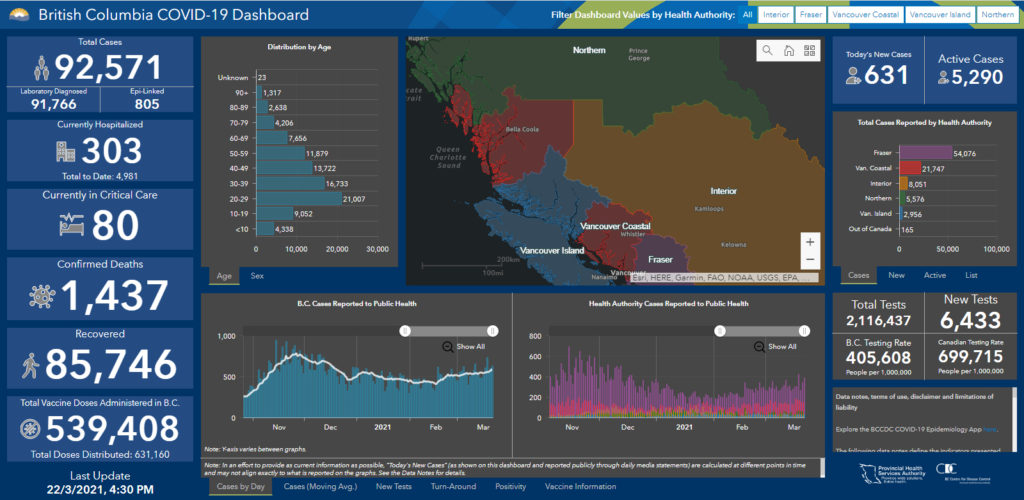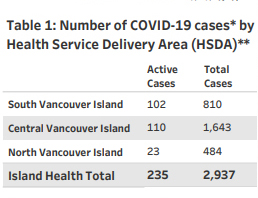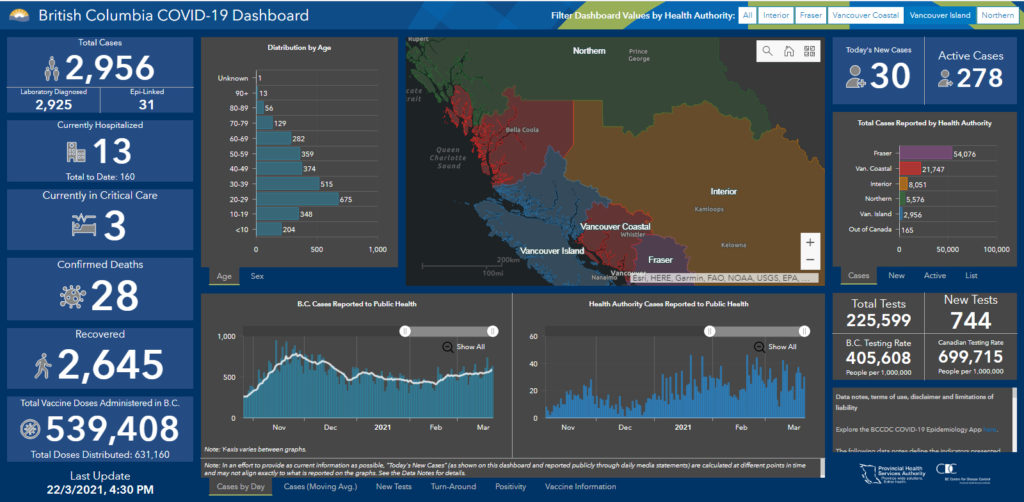
Monday March 22, 2021 | VICTORIA, BC
by Mary P Brooke, B.Sc., Editor | Island Social Trends
Reporting some robust case counts from over the past weekend — including a high number of hospitalizations and another 16 deaths, Provincial Health Officer Dr Bonnie Henry expressed concern about the robust levels of COVID-19 transmission as reflected in the stubborn numbers.
There are at least two key aspects in the race against time in this phase of the pandemic, based on Dr Henry’s comments today:
- how quickly vaccines can be administered while the variants of concern continue to infiltrate the case numbers (B.1.1.7 is already gaining ground and now the P.1 variant is increasing in BC cases); and
- now that many elderly people are vaccinated, the virus is finding targets in younger people (producing a higher number of hospitalizations and deaths among young adults, even in their 30s).
Being specific about wording, Dr Henry said she resists calling this phase of the pandemic a ‘third wave’, but clearly this is another high level of cases and transmission after a slight plateau in February. The first wave was at the start of the pandemic in spring 2020, and the second wave was from mid-November 2020 through the holiday season into January of this year.
COVID numbers with regional view:
Over the weekend there were 1,785 new test-positive cases of COVID-19 across BC, bringing the total to 92,571 pandemic-to-date. Of those, 5,290 cases are active and 303 people are hospitalized (highest number this year so far) with 80 in ICU. One of the highest numbers of people so far — 9,300 –are self-isolating due to exposure.

The most robust transmission and case counts are being seen in Fraser Health, with Surrey at the epicentre, as noted by Dr Henry today. A lot of that has to do with large multi-generational households in which the virus has an easier chance of spreading, she said today. Teachers in the Surrey School District (SD36) will be prioritized to receive the AstraZeneca vaccines as soon as possible, said Dr Henry.
Case numbers here on Vancouver Island have been generally lower than elsewhere in the province throughout the pandemic (2,956 in total, with 278 presently active, and a total of 28 deaths). Island Social Trends has asked Island Health for their speculation on reasons for that, but until that response comes in, it would be a safe bet that islanders generally are frequently active outdoors, the population is less dense here than on the mainland, and many occupations take place outdoors.
Vancouver Island also has been seeing a consistently lower number of test-positive cases among people in the 40 to 49-year age grouping throughout the pandemic, which Island Health also has not commented upon specifically.

It could have to do with fewer people in that age group working in frontline jobs (including health care), that many jobs are outdoors for people in that age group, and/or that people in the 40s on the island have jobs that they can do from home.
Variants of concern:
Over the weekend, 166 of the 1,785 new cases (9.3%) have resulted from infection by the variants of concern (VOC). That brings the total of VOC cases in BC to 1,366 (that’s already 1.5% of total cases in the pandemic-to-date). Presently 237 VOC cases are active, which is 4.5% of all active cases in BC.
Breakdown of VOC’s to date in BC:
As outlined by Dr Henry today:
- B.1.1.7 (UK): 1,240 cases (this variant is ‘replacing’ the original virus in the test-positive case profile)
- B.1.351 (South Africa): 41 cases
- P.1 (Brazil): 85 cases (another 20 just this past weekend, with two major clusters)
The virus lives to spread:

“We are still in a challenging time,” said BC Health Minister Adrian Dix today. He says the COVID case numbers and hospitalizations “are still too high” and “moving in the wrong direction.
“The virus lives to spread and spreads to live,” said Dix. “And that’s it,” he said to emphasize the simplicity of the virus which of course is juxtaposed against the immense complexity of wrestling it to the ground with the actions of public health together with the actions that are taken by individuals, businesses and communities.
“There is no point in having a staring contest” with the COVID-19 virus, Dix continued, and then concluding on this metaphor with this: “COVID never blinks”.
Dix urges people to adhere to the public health protocols that are proven to work: physical distancing, hand washing, wearing a mask — even now, as vaccination efforts are underway. It takes time for the vaccines to kick in (within individuals as well as toward creating herd immunity).
School exposures ahead of spring break:
Exposures that happened in south Vancouver Island schools ahead of spring break are currently listed as active exposures by Island Health:
- SD61 – Lansdowne Middle Middle (north campus) – March 10, 11, 12.
- SD61 – South Park Elementary School – March 8, 9, 10, 11, & 12.
- SD61 – Spectrum Community School – March 8, 9, 10 & 11.
- SD61 – Lansdowne Middle School – March 3, 4, 5 & 9.
- SD62 – Lakewood Elementary School – March 12.





